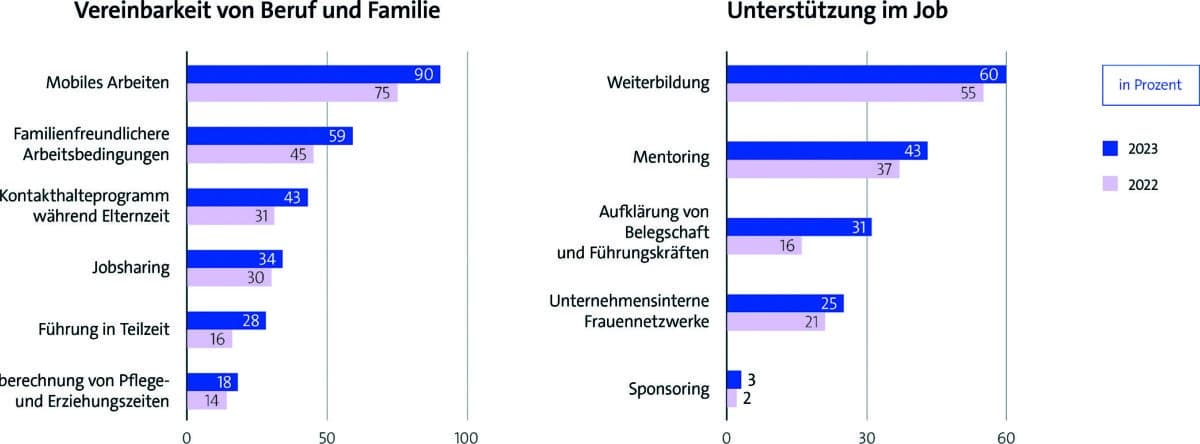The Tech Industry Wants to Attract More Women to the Field


In 2023, the proportion of women in the workforce in the ICT industry as a whole will be roughly on a par with the previous year, at an average of 15 percent. "It is absolutely clear: ICT companies need more girls and women," says Susanne Dehmel, member of the Bitkom management board. "The industry has also recognized that more women are needed in digitization—that also means more digital participation, more technological innovation and more economic success. However, progress in implementing this realization remains slow. We must not lose any more time."
Girls' Day
The low proportion of women is also due to the fact that significantly more boys than girls still choose to study in the field of IT after leaving school. This is one of the reasons why Girls' Day, which took place this year on April 27, has been held for years and is intended to provide children and young people with career guidance free of role models. To date, only 1 out of every 20 trainee positions (5 percent) in the ITC sector has been filled by a woman on average. While the proportion of women in large companies is 8 percent, the figure is 7 percent in medium-sized companies and only 4 percent in small companies.
Large companies with 500 or more employees are somewhat further ahead. While on average one in four of their positions is held by a woman, the proportion in medium-sized companies (50 to 499 employees) is 16 percent and in small companies with 10 to 49 employees only 14 percent. In one in five small companies, there is not even a single woman on the staff. These are the findings of a survey conducted by the digital association Bitkom, for which a representative sample of more than 500 ICT companies was questioned.
However, ICT companies would like to see more women in their workforce. 92 percent say mixed teams contribute to a better working atmosphere, and three quarters are convinced that the proportion of women increases productivity and creativity. 86 percent see an increase in the proportion of women in their company as a fundamental opportunity. What's more, a clear majority even see the competitiveness of the digital industry in jeopardy without an increase in the proportion of women. Three out of four ICT companies say that without women, the industry will lose its future. 59 percent are convinced that the ICT sector will not solve the problem of skilled workers without women.
The desire to attract more women and girls to the digital industry is expressed, among other things, in concrete internal targets. By 2023, just under one in three companies has already set targets for increasing the proportion of women. 19 percent are planning to do so in concrete terms, while 24 percent are discussing it. However, 22 percent also say that such internal targets are not an issue for them. Those who do not set any goals explain their reluctance primarily with the lack of qualified female applicants and other priorities in the company. On the other hand, only 8 percent see no need for action at all. "The past has shown that without concrete goals, it will be difficult to actually significantly increase the proportion of women. Even though the last few years with multiple crises have presented companies with a variety of different challenges: Every company should consider how women can be recruited for vacant positions," says Dehmel.

How ICT companies want to better support women. Which of the following measures are you currently using or planning to use to promote women's careers in the company? n=503, Source: Bitkom 2023.
Career Planning
At least more companies have clear responsibilities for gender equality and career planning for men and women. In 2022, half of ICT companies stated that no one was taking care of these issues, but this figure has now fallen to just 44 percent. At the same time, the topic is increasingly becoming the focus of management. Whereas in the previous year, management was only responsible for the topic in 22 percent of ICT companies, in 2023 that percentage is already at 32 percent.
In the search for new skilled workers, a large proportion of the digital industry is already making targeted efforts to recruit women: 9 out of 10 ICT companies are using recruiting measures aimed specifically at women in order to draw their attention to their company and win them over. Cooperation with universities and schools is the most widespread strategy. 61 percent of ICT companies say they already cooperate or are planning to do so. Dehmel says, "The ICT industry has recognized that it needs to make active efforts as early as possible to arouse interest in digital topics among young women and girls. Trial days such as Girls' Day, as well as longer university internships and cooperation with educational institutions, are an important building block in providing authentic insights into the digital world of work and doing away with outdated role models."
However, women who already work in ICT companies are also being promoted to a greater extent. Particular importance is attached to improving the work-life balance: 9 out of 10 companies enable or plan mobile working to promote women's careers in the company, and 6 out of 10 companies generally focus on family-friendly working conditions such as flexible working models. Part-time management is now already offered or planned by 28 percent. In addition, 60 percent of ICT companies are planning or using training programs to promote women, and 43 percent are using mentoring programs. "There is a growing awareness in the digital industry of the enormous importance of promoting women. The increasing number of measures taken shows we are on the right track, even if we need to increase the pace significantly," says Dehmel.
Education Policy
In Bitkom's report, not only companies, but also policymakers are called upon to attract more women to the digital industry. In addition to internal company measures such as setting targets, personnel responsibilities, and training and support programs for women, politicians need to invest more in the childcare infrastructure and an education policy that gives equal consideration to digital issues. This includes, for example, more attractive training and study curricula as well as mandatory computer science classes. "Companies are equipped with very different financial and human resources. At the same time, important foundation stones for later career orientation are already laid in schools and universities. The challenges that ICT companies have to overcome on the way to more diversity are therefore not only individual, but also multi-layered. This makes it all the more important for companies, politicians and civil society to pull together," says Dehmel.






